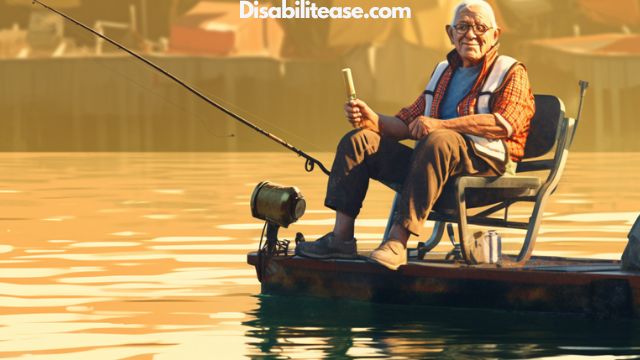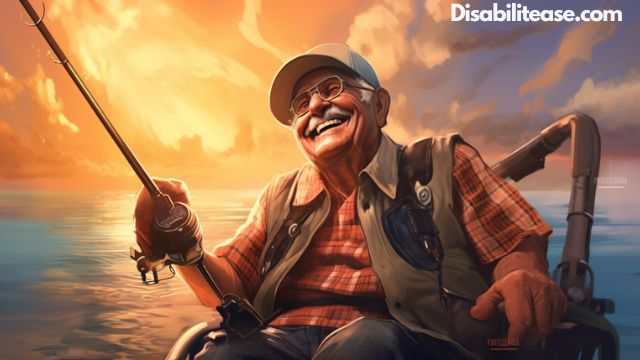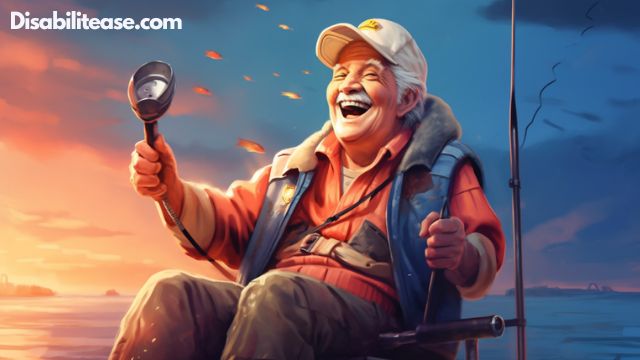Participating in water sports can help individuals stay active and healthy, regardless of age or physical ability. It’s possible for disabled and elderly individuals to take part in a range of exciting activities that are suitable for their level of ability.
In this article, we’ll look at:
- Adaptive water sports
- Assistive devices
- Safety considerations
This way, you can get the most out of your aquatic adventure.

Table of Contents
Adaptive Water Sports
Adaptive water sports provide a fun and inclusive way for disabled or elderly individuals to participate in aquatic activities. Organizations like Disabled Sports USA offer tailored programs that provide accessible equipment, and professional coaching and are adapted to accommodate the individual’s unique needs.
List Of Adaptive Water Sports:
| Sport | Description |
|---|---|
| Kayaking | Kayaking can be adapted for those with physical limitations. Individuals can sit in the kayak rather than kneel in it, which is especially beneficial for those with difficulty balancing. |
| Sailing | Sailing can be adapted for those with physical limitations. Specialized equipment such as a lift chair and electric winches allow the disabled and elderly to participate in the sport. |
| Swimming | Swimming is an excellent form of exercise for the disabled and elderly. It is low-impact and provides a great workout. |
| Water Aerobics | Water aerobics is a great way for those with physical limitations to get a good workout without putting stress on their joints. |
| Jet Skiing | Jet skiing can be adapted for those with physical limitations. Specialized equipment such as a lift chair and electric winches allow the disabled and elderly to participate in the sport. |
| Water Polo | Water polo is a great way for those with physical limitations to stay active. The sport can be adapted with a few modifications, such as having larger goals and a bigger playing field. |
| Rowing | Rowing can be adapted for those with physical limitations. Specialized equipment such as a lift chair and electric winches allow the disabled and elderly to participate in the sport. |
| Water Volleyball | Water volleyball is a great way for those with physical limitations to stay active. The sport can be adapted with a few modifications, such as having larger goals and a bigger playing field. |
| Stand-up Paddleboarding | Stand-up paddleboarding can be adapted for those with physical limitations. Specialized equipment such as a lift chair and electric winches allow the disabled and elderly to participate in the sport. |
| Fishing | Fishing is a great way for those with physical limitations to stay active. It requires little physical exertion and is a great way to spend time outdoors. |
The adaptive water sports program offered by the organization is designed to allow all participants to experience the joy of being on or near the water safely.
In most of these programs, qualified coaches help participants learn how to use specialized adaptive equipment such as specially designed sailboats, kayaks, and paddleboards.
This enables people with physical disabilities to access all kinds of aquatic activities from sailing and fishing to jet skiing and more!
In addition to providing adapted equipment, many organizations also offer inclusive coaching services that cater specifically to disabled or elderly participants.
Coaches can help individuals develop their skills while making sure they feel safe and comfortable during every activity. They also work closely with participants so they can adjust their instructions according to their needs as well as provide support if needed.
These adaptive water sports programs enable those with disabilities or age-related limitations an opportunity to be part of a recreational activity that offers physical exercise combined with an enjoyable experience out on the open waters!
Participants have reported feeling empowered through having access to the necessary tools that allow them to fully participate in this exciting activity while creating memories that will last a lifetime!
Assistive Devices

Seeing a loved one take to the water despite physical limitations can be an incredibly empowering experience. Fortunately, modern technology is making it easier for disabled or elderly individuals to participate in aquatic activities.
Assistive devices are becoming increasingly inclusive and accessible for those with physical disabilities, allowing them to move more easily in the water.
There are several assistive devices available on the market that cater specifically to those with mobility impairments. Many of these products are made from lightweight materials like foam and plastic, allowing users to keep their bodies afloat while using minimal energy.
Aquatic therapy is another option that provides support via specialized equipment such as floating chairs, wheelchairs, and walkers designed specifically for use in the water.
Here are a few examples of popular assistive devices:
- Floatation belts – These adjustable belts provide extra buoyancy and stability while swimming or participating in other aquatic activities.
- Pool lifts – Pool lifts help those with physical limitations get into and out of pools safely without assistance from others.
- Aqua treadmills – Designed for therapeutic exercise, aqua treadmills enable users to move through the pool at various speeds depending on their fitness level or disability-related needs.
- Hand bikes – An adaptive bicycle that’s powered by hand instead of feet, hand bikes allow people with limited leg mobility to enjoy cycling around a pool or lake while also getting some exercise.
Assistive devices not only make it easier for disabled or elderly individuals to participate in water sports, but they also give them independence by enabling them to perform activities independently without needing additional help from someone else.
This can be especially important when it comes to recreational activities like swimming, which may otherwise be difficult due to physical disabilities or age-related issues such as limited strength and flexibility.
With access to inclusive equipment designed specifically for use in the water, disabled or elderly individuals now have more opportunities than ever before when it comes time for fun in the sun!
Safety Considerations

Safety is paramount for anyone taking part in aquatic activities, especially those with physical impairments or age-related challenges. To ensure safety and reduce the risk of injury, individuals should always consider their own abilities before participating in any water sports.
It’s important to remember that social distancing measures should be observed when engaging in such activities, and accessibility barriers may need to be taken into account depending on the activity being undertaken.
In addition, disabled or elderly individuals should always wear life jackets or other appropriate flotation devices whenever they are entering the water. Equipment such as wheelchairs can also be adapted for use in shallow waters so individuals don’t have to miss out on the fun.
For more challenging water sports like scuba diving, adequate training and instruction from a qualified instructor must be obtained beforehand.
It is highly recommended that disabled or elderly individuals go through an initial assessment with a specialist who can provide advice on which activities are best suited for them and how they can adapt these activities to suit their individual needs. With this information, it’ll become easier for them to enjoy and safely participate in aquatic activities.
Conclusion
You don’t have to miss out on the fun of water sports just because you’re disabled or elderly. With adaptive water sports and assistive devices available, you can still participate in aquatic activities safely.
Don’t be afraid to try something new – with a little bit of creativity, you can find ways for everyone to enjoy spending time on the water.
You’ll be glad you took the plunge and had a great day out!

Hi, my name is Eddie, I am a professional trainer specializing in the elderly population and I’m also a website designer. I love training in the gym, going to the beach, traveling, and having good food.
I combined my love for sport and website designing to make “DisabilitEase” whose purpose is to help elderly and disabled people live a more full and active life, have more fun, and enjoy their unique journey despite any disability.



